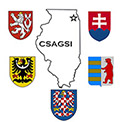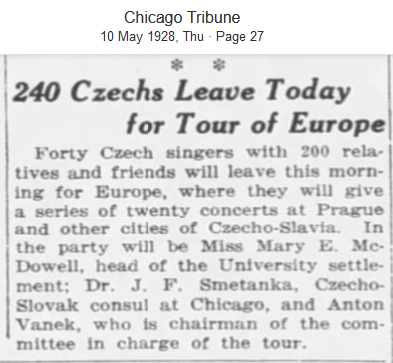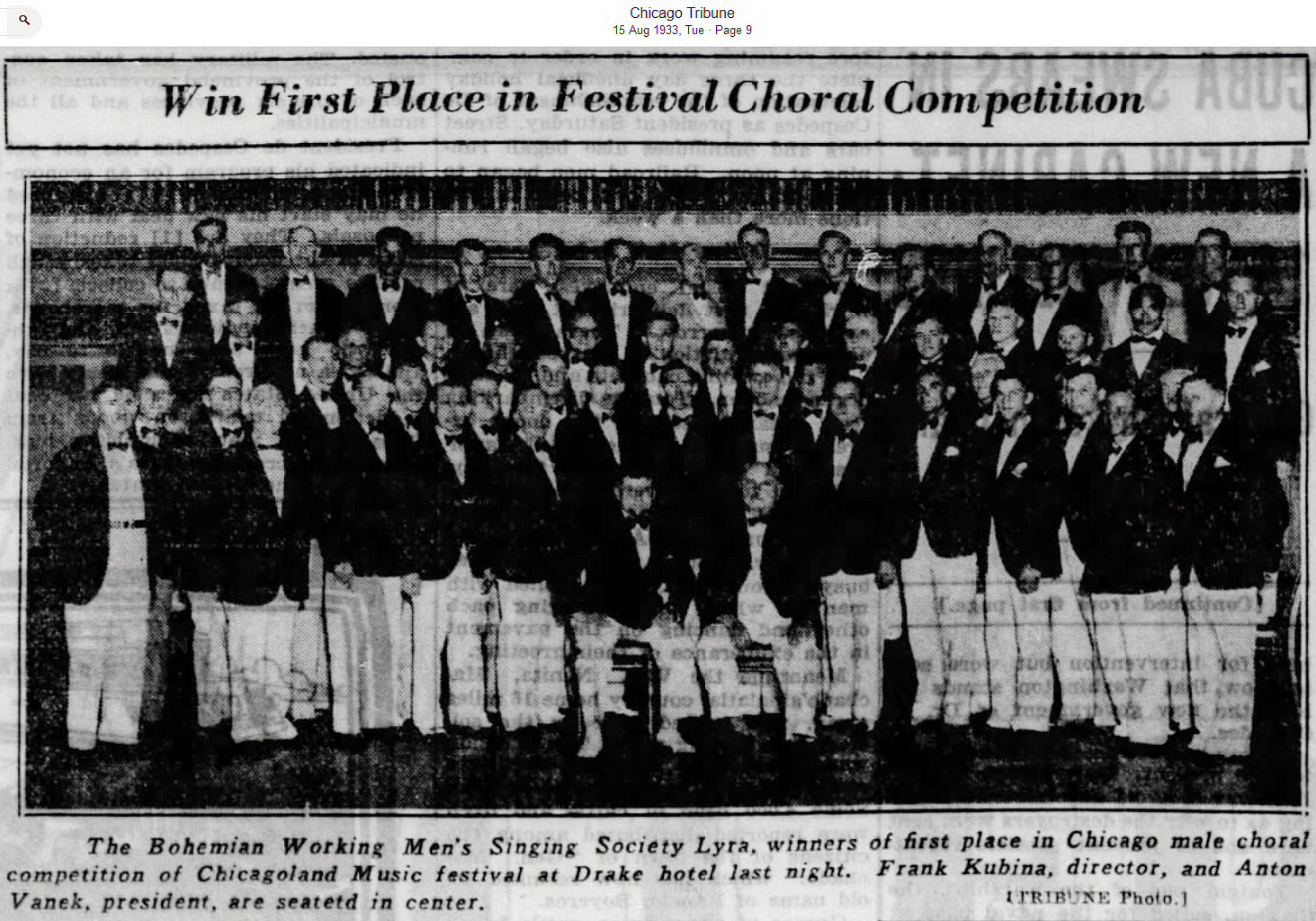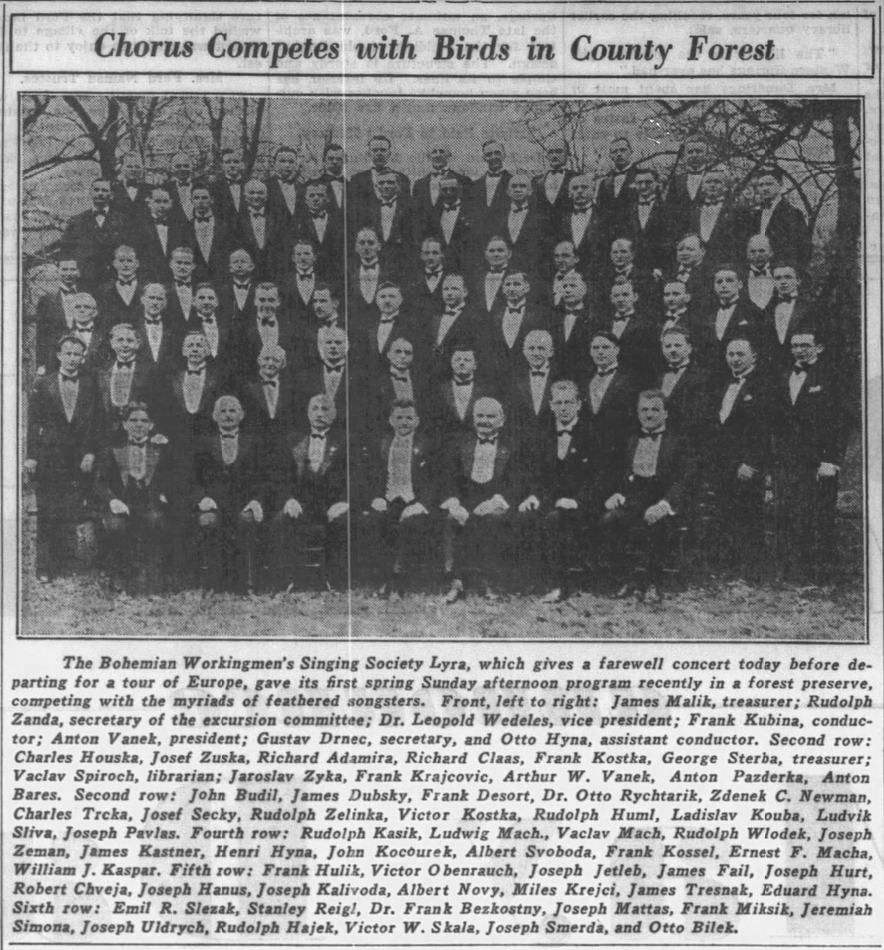Anton Vanek 1872 - 1945
Business Man, Politician, Chicago Library Board, Choir Director
It is probably safe to say that all parents want their children to do better than them. Many Czech families, with limited choices at home, would migrate to the United States, less for the benefit of parents, more for the prospects of their children being able to do well in a new country.
Anton Vanek can serve as a good example of this. Anton's parents, Tomas and Alzbeta were married in 1869 in Domazlice. Anton was born on September 9, 1872 at Hořejší Předměstí #15, which is part of Domazlice, district of Plzen. Anton came to the United States from his native Czechoslovakia in 1887, arriving with his father Tomas, on 9-6-1887, to New York, aboard the ship Werra. (No verfied record of when mother Alzbeta or any other children arrived, found so far.)

Anton's September 20, 1945 obituary in the Chicago Tribune describes that he was a student at the Chicago Art Institute. His first occupations, listed in the 1895 Chicago Directory were stone engraver and in the 1900 Census, as a lithographer. (1)
Anton married Clara Baumayer of Chicago on December 28, 1895, and in the 1900 Census, Anton, Clara and children were living with Anton's parents and sisters on 18th Street in Chicago. (2)
1900 Illinois Cook Chicago Ward 8 D0211 Page 25 at 372 W. 18th
Thomas Vanek 56, Elizabeth 53, Elizabeth 17, Mary 12
Anton Vanek 27, Clara 24, Robert 3, Victor 2 (Anton is a Lithographer)
By the 1910 Census Anton had changed occupations. He is listed as having a business in real estate. Anton, his family and his parents have also left the Pilsen community and moved to Lawndale. The area was part of the 34th ward which would become his fome for several decades and the ward in which he would enter the realm of Chicago politics. (3)
1910 Illinois Cook Chicago Ward 34 D1484 Page 45-46 at 2337 South Central Park Avenue
Anton Vanek 37, Clara 35, Robert 13, Victor 11, Arthur 9, Charles 7, Lillian 5, Clara 2
Thomas Vanek 67, Elizabeth 63
Anton's wife Clara died in 1917, and his father, Tomas, died in 1918.
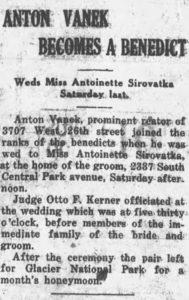 1920 Illinois Cook Chicago Ward 34 D2174 Page 23 at 2337 Central Park Avenue
1920 Illinois Cook Chicago Ward 34 D2174 Page 23 at 2337 Central Park Avenue
Anton Vanek 46, Robert 24, Victor 22, Arthur 18, Lillian 15, Charles 14, Clara 11, Anton 9
Elizabeth Vanek 73
On August 6, 1927, Anton married again. His wife was Antonya Sirovatka, born February 23, 1883 in Chicago to Frank And Anna Sirovatka. One could note that Anton knew many of the Bohemians who would play prominate roles in Illinois and the Bohemian community, as Judge, later Governor, Otto Kerner performed the marriage ceremony,
Anton's mother, Alzbeta, died in 1929.
1930 Illinois Cook Chicago D2616 Page 7at 2337 Central Park Avenue
Anton Vanek 56, Antonia 43, Arthur 28, Charles 24, Anton 19
1940 Illinois Cook Chicago 103-1439 Page 11 at 2337 South Central Park Avenue
Anton Vanek 67, Antoinette 57
In 1926, a book, Zlata Kniha, was published to commemorate the fiftieth anniversary of the publication of Chicago's Czech foreign language newspaper, Svornost. The book contains many great articles on Czech life and institutions in Chicago, and many good biographies of prominent Czech community members of the time. Anton Vanek was one of those biographies. (Google Translate)
"An honest and unselfish national worker"
One of our leading, well-enthusiastic national workers and well-known in singing circles is our compatriot Mr. Anton Vanek, founder of the reliable land company Anton Vanek and Sons.
Born in Domazlice 8, in September 1972, he attended public school, one year of boarding school and three years of real gymnasium.
On September 8, 1887, a 15-year-old boy came to America with his father, Tomas Vanek, and his first job was in a sawmill for $4 a week; then he worked in several factories and in 1988 he began to learn as a draftsman and engraver in a lithographic workshop.
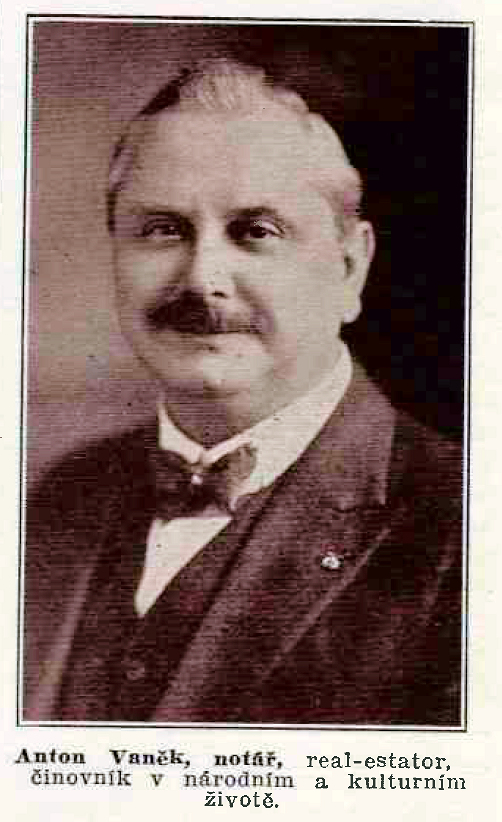 When he was a student, he attended evening school at the Art Institute for two semesters, in addition he took private lessons with Mr. H. Farsky's teacher, he is very fond of drawing, but he soon realized that the art of that time in America was "running wild" and devoted himself in stone-engraving, in which he soon became so perfect that he was known throughout the United States as a first-class "Vignette engraver", and from 1894 to 1906 he ran an independent workshop. In 1906, on the advice of his friends, he started a notary and real estate business, while still working as an engraver until 1907, although the beginnings of his new profession were not so great.
When he was a student, he attended evening school at the Art Institute for two semesters, in addition he took private lessons with Mr. H. Farsky's teacher, he is very fond of drawing, but he soon realized that the art of that time in America was "running wild" and devoted himself in stone-engraving, in which he soon became so perfect that he was known throughout the United States as a first-class "Vignette engraver", and from 1894 to 1906 he ran an independent workshop. In 1906, on the advice of his friends, he started a notary and real estate business, while still working as an engraver until 1907, although the beginnings of his new profession were not so great.
However, after two years, the business improved a lot, thanks to solidity and diligence, which was devoted to all, even the smallest matters entrusted to the office, and so shortly after that, he took all his sons into the business, and for the last 4 years the business has been run under the firm "Anton Vanek and Sons at No. 3707 West 26th Street, and is well known for its honest and comprehensive dealings throughout Chicago and vicinity.
Today, the shop of A. Vanek and Sons is one of the leading shops, where you can turn to with complete confidence in all matters of land, notary, legal, loans, insurance, shipping.
In his national life, we meet him as a 16-year-old youth, when he founded the "Hlahol" Choir; at the founding of the Vzel Club, Ladimir Klacel; he was a member of the volunteer choir "Kolar" and appeared in some roles here and there. His "hobby" from the first beginning of his arrival in America until today is the cultivation of Czech choral singing; he also founded Ces. Headquarters. Pevecká Jednota and during the merger of "Hlahol" with Ces. Delnicky Pev.Sbor, He became an active member of the choir until today.
In 1892 and 1898 he was the secretary of "Matice Skolske" for schools in Bohemia; he was one of the founders of Ceske Beseda, and there was not a single national enterprise in which he was not warmly involved over the years. He took great interest in the liberation of our homeland during the liberation movement and generously supported it.
During the war, he was appointed by Governor Frank O. Lowden as chairman of the Board of Appeal (Local Board No. 83), which he considers the saddest part of his life. Not only does his heart always and will be open for the little people, he saw the immense pain of his comrades who had to go to war, but he often sat past midnight at the bedside of his seriously ill wife, dear Klara, who also died at the end of December 17, leaving behind five boys and two girls here. The eldest, Robert I., runs a real estate business, Victor H. is employed at the Chicago Stock Exchange and, while doing so, studied law at the Kent College of Law; Arthur W. is a clerk in a postman's store; Charles R. is a sophomore at Ann Arbor University in Michigan; the youngest, Anton T., is in his third year at Harrison High School. Daughters Lillian C. and Clara H. take care of this large household together with Antonio Vanek's dear, kind-hearted mother, Alzbeta Vanková, known as "Grandma Vanková", who finds the most sincere longing that she devoted her whole life with unconditional love to her family and children of her son Ant. Vanek.
He is also an inveterate traveler, traveling almost all over the United States, Cuba, Alaska, and in 1921, central Europe. In addition to singing, he is an intrusive walker, swimmer, loves nature above all else. In summary; An honest guild, a good American citizen, an honest businessman, pure free-spirited. (Biography - Anton Vanek - Zlata Kniha, August Geringer Publisher, Chicago, Illinois, 1926, Page 259)
The biography also included a listing of the clubs, organizations, societies, etc. that Anton participated in up to 1925.

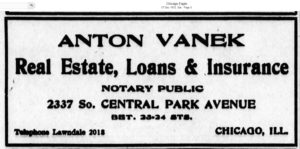 Anton Vanek - Real Estate and Finance
Anton Vanek - Real Estate and Finance
Anton involved himself in multiple aspects of the real estate business. This would continue throughout the remaining years of his working career and on into that of his sons, when Anton's real estate business was reorganized as "Anton and Sons". (Image Left) (4)
Advertisements and newspaper articles provide a glimpse into the facets of his business involvement. Anton was a notary, a common occupation and one advertised often among early Bohemian businessmen. Anton not only sold existing homes for clients; he also teamed up with others to create and sell lots in subdivisions. In 1917 he was involved in the development of a subdivision in Brookfield. 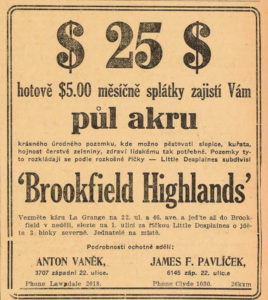
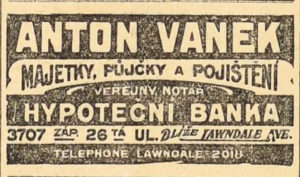 (Translation found at Foreign Language Press Survey) May 27, 1917 - Denni Hlasatel - "In these days of mounting prices, it is advantageous to live in a neighborhood where it is possible to partly escape the high cost of living. There are fertile patches of land in Brookfield which are being sold in half-acre lots by Anton Vanek, 3707 West 26th Street, and J. F. Pavlicek, 6145 West 22nd Street. The lots are situated along the Desplaines River, and may be reached by the La Grange streetcar. Vegetables can be grown there and poultry raised." (5)
(Translation found at Foreign Language Press Survey) May 27, 1917 - Denni Hlasatel - "In these days of mounting prices, it is advantageous to live in a neighborhood where it is possible to partly escape the high cost of living. There are fertile patches of land in Brookfield which are being sold in half-acre lots by Anton Vanek, 3707 West 26th Street, and J. F. Pavlicek, 6145 West 22nd Street. The lots are situated along the Desplaines River, and may be reached by the La Grange streetcar. Vegetables can be grown there and poultry raised." (5)
Vanek also belonged to, and participated in, a very important component of the Bohemian real estate development. A form of self help, which focused on providing assistance to Czechs seeking home ownership, were Bohemian building and loan assocations. Writing in the Denni Hlasatel, Joseph Voborsky mentioned that in 1920 there were 110 of those associations. Those associations were instrumental in providing funding to Bohemians as they pursued part of the American Dream, a home of their own. The League of Bohemian Building and Loan Assocations was founded in 1907. Anton Vanek was on the executive committee. Anton is listed as a member attending a number of their annual conventions. (6)
In 1924, Vanek joined other realtors, many also Bohemians to form their own local organization. ( Chicago Tribune - July 20, 1924, page 29 ) - "Brokers Form Realty Board on Southwest Side" - The registered brokers in the southwest and suburban districts have formed an organization known as the Protective Real Estate Board of Cook County. First steps toward organization were taken four months ago, and it is announced that the membership is now 200. Headquarters are 2606 South Avers avenue. charles Klicka is president; Anton Vanek is first vice president; John V. Kavan is treasurer and Louis Jalovec is secretary ........."
When Anton retired, his company "Anton and Sons" continued. Image below (7)
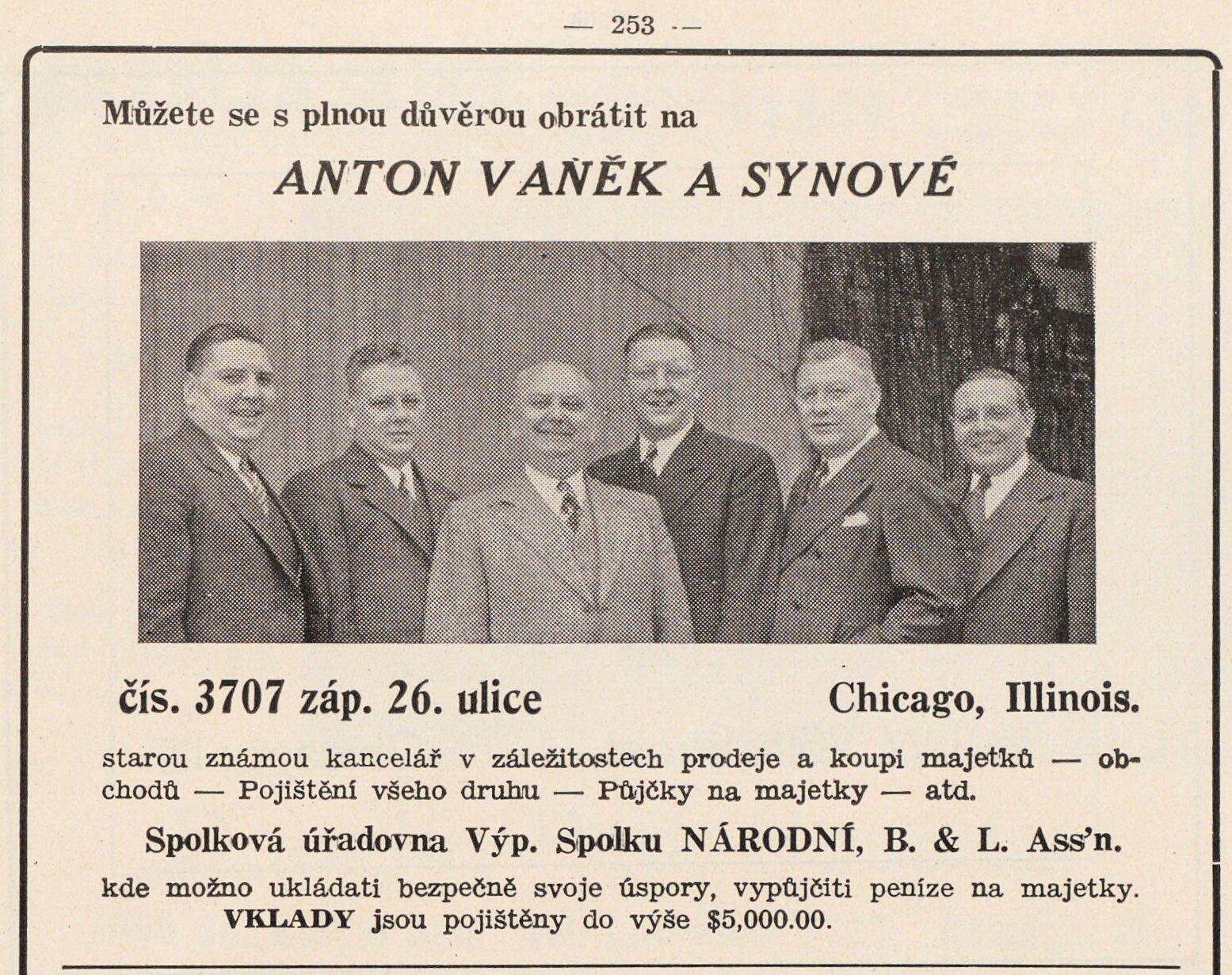
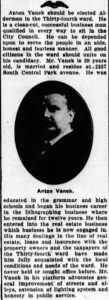 Anton Vanek - Politics
Anton Vanek - Politics
Anton Vanek was involved in Chicago politics. In 1897, while still living in the 8th Ward, Anton is listed as a Republican Election Judge. On March 25, 1907, page 3 of the Chicago Tribune, an article was published - "At a large meeting in Libuse hall, 934 West Twelfth street, in the afternoon the Bohemian Republican Club was organized, with C.T. Preger president, Anton Vanek secretary, and Joseph A. Smejkal treasuer. Resolutions endorsing Busse were adopted."
On March 25, 1907, page 2 of The Inter Ocean newspaper (Chicago), an article was published "Bohemians Aid Busse" - The Bohemian Republicans met yesterday at the corner of Twelfth and Robey (Damen) streets and organized a Busse Bohemian Club. Anton C.T. Pregler was chosen president; Joseph A. Smejkal, Treasurer, and Anton Vanek, secretary......
The 1910 census lists Anton as living in the 34th Ward. By 1912 Anton was already running for alderman of the 34th Ward. He would became the alderman.
It is interesting to note that newspapers carried endorsements of candidates, complete with good summaries of each endorsed candidtate. (8)
Click on the image for a larger view.
WW1 - Anton Vanek is a member of a Recruiting Commission
The Foreign Language Press Survey is a great resource. It is available online through the Newberry Library. (ftps.newberry.org)
In 1917 Anton Vanek was part of recruiting commission for the 27th and 83rd divisions. Below is an article, not much on Anton, but really a great article to read on how the Bohemian community came together during World War 1 and an article which included so many Bohemians who were, or would, play prominent roles in the Bohemian community.
Below are two articles from Dennis Hlasatel, translated by the Foreign Language Press and posted at the Newberry site. (Search Anton Vanek"
Parade and Meeting Attract Thousands Denní Hlasatel, Dec. 3, 1917 Page 7
If there were any who had the slightest doubts about the friendly feelings of the Chicago Czechs for the Allied nations, or about Czech loyalty to the United States, their misgivings or suspicions were allayed and converted into confidence by the parade which led through the streets of the "Czech California" district and the subsequent meeting held in the auditorium of the Sokol Havlicek-Tyrs, South Lawndale Avenue and West 26th Street, yesterday. The spirit of genuine patriotism was so strongly manifested that it made the heart of everyone who witnessed the events throb with emotion.
The Auxiliary, composed of citizens of the Thirty-fourth and Twelfth Wards, was the sponsor of these two patriotic demonstrations, the purpose of which was primarily to show to our Chicago Czech boys who enlisted last Wednesday for service in Uncle Sam's Army that they will be remembered, encouraged, and aided whenever help is needed. The Auxiliary succeeded in this, for many soldiers were given furloughs and thus could participate in the festivities. They had taken part in the great parade held in the city last Saturday. Members of the Auxiliary, including Alderman John Toman, Anton Vanĕk, Anton J. Čermák, chief bailiff of the municipal court, and Judge Otto Kerner, had appealed to the military authorities to grant the soldiers a furlough for Sunday so that they could be present at yesterday's (Sunday's) manifestation. The request was granted and, in addition, a military band was placed at the disposal of the Chicago Czechs. Officers of the United States Army joined the marching columns headed by Colonel Chas. R. Howland.
The marchers started from the home of Sokol Chicago. The parade began at 2 P. M. led by a squad of mounted police and a group of policemen from the Lawndale Avenue station under the personal command of Captain Ptáček. Mr. Otto Pelikán was marshal. He was followed by Boy Scouts with their commander, J. A. Sokol. Then came the band of an artillery regiment called The Czech, because it consists mostly of soldiers of Czech descent. The Pomocne Občanskĕ Vyborý (Citizens' Auxiliary Committees) of the Twelfth and Thirty-fourth Wards were next, headed by their chairmen, Anton J. Čermák and V. Jelínek. The recruiting commission for the 27th and 83rd divisions was led by Messrs. Baumruck, Anton Vanĕk, A. Rezím and Dr. Žábokrtský. They were joined by such leaders in our civic life as Alderman John Toman, Judge Otto Kerner, Mr. Novák, and Judge Joseph Uhlíř of the municipal court.
The hub of the parade was formed by the soldiers with Colonel Charles R. Howland and other officers of the United States Army. They and the other soldiers had come from the military training camp at Rockford, Illinois; they all had taken part in the parade held in the downtown district yesterday.
The marching columns did not have to worry about how to attract the attention of the people. The men were wildly acclaimed by the throngs who lined the sidewalks or watched from their houses. This assured our soldiers that they will not be forgotten when they face the enemy to fight for world democracy. They are leaving, but they take with them the heartfelt wishes of millions of Americans for victory and a happy return. There were about two hundred to two hundred and fifty soldiers who were hailed by the throngs. Men waved their hats, and women waved their handkerchiefs or lifted up their children so that they might wave. Our brave men marched on with a firm military step befitting a soldier. They appeared undisturbed by the loud demonstrations of friendship and good will, yet their hearts must have been filled with strong emotions and their memories overflowing with thoughts they would never forget.
The scenes of enthusiastic welcome were repeated in every stage of the parade, whether on Kedzie Avenue, 22nd Street, Whipple Street, 25th or 26th Streets, Central Park Avenue, 28th Street, Crawford Avenue, or 26th Street again. The march as far as 42nd Street was omitted, because the furloughs of some of the soldiers were limited.
The parade came to a halt at the home of Sokol Havlicek-Tyrs. There a large crowd had assembled even before the parade began, and the auditorium was filled to the last place. As a safety measure the police locked the doors, in accordance with the city ordinance. Thousands tried to enter but had to content themselves with standing outside. However, due regard was shown to one part of the participants in the parade, for reservations had been made for them. At 3 P.M. our soldiers entered the hall while the strains of the "Star-Spangled Banner" filled the air. They were, however, compelled to leave immediately afterward, to the utmost regret of everybody, for duty bade them leave Chicago for Camp Rockford, and the military band left with them. The welcome extended to our soldiers had thus in reality become a farewell.
The business proper of the program was then begun. Mr. V. Jelinek, chairman of the Auxiliary committee of the Thirty-fourth Ward, presided, and introduced the first speaker, Colonel Howland of the United States Army, who expressed his desire to be regarded as a soldier rather than a speaker. A stormy welcome was given this sincere friend of the Czechs. In terse sentences, characteristic of the stern commanding officer, he declared that he was glad of the fact that the majority of the men in the military unit commanded by him were Czech. His men, he declared, are soldiers, body and soul, whose hearts beat for America, the Allies, the Czechs, and the Poles. They will help to liberate the small nations and will accomplish this by their loyalty to this country, which has become their new homeland either by their own selection or by that of their parents. Colonel Howland openly declared himself to be a representative of the American Army who sincerely stands for the liberation of the small nations, particularly of the Czechs and Poles, whom he knows as people of the right sentiment, undaunted and deserving of liberty. The time may be near, he said, when he and his men will face the enemy upon the battlefields of France. No one of his soldiers dreads that moment but, on the contrary, every one is eagerly anticipating it, if for no other reason than to return victorious very soon.
These few words had a magic effect upon the audience. Everybody, particularly mothers and wives, was convinced that the Colonel was a stern leader of his soldiers, true enough, but a good friend nonetheless. He was acclaimed with great ardor when he and the rest of the army officers were leaving the hall early, in order to be in Camp Rockford on time.
There were three young army officers of Czech descent who were given a place of honor among the guests and Chicago Czech leaders. They were First Lieutenant George Engelthaler, Second Lieutenant Ed. Ptacek, son of Police Captain Ptacek of the Lawndale Avenue station, and Second Lieutenant A. Lang. All the officers were the guests of the Ceska Beseda (Czech Circle) yesterday noon.
Lieutenant Perigord of the French Army was introduced. He related some of his experiences on the battlefields. He described the sufferings that France had to endure, and he declared that his country is ready to hand over to America the banner of liberty--to America, the stronger, mightier country, which will carry the emblem of freedom for the Czechs, Poles, and other Slav nations that are under the heel of Austria today. He called attention to German propaganda which is attempting to impede the war activities of the Allies. The armies that America is building up now will guarantee not only ultimate victory, but lasting peace as well. He consoled the mothers and wives of those soldiers who will return no more, and assured them that the heroes' graves will be under the tender care of French wives and mothers. The French guest spoke with great ardor, and when leaving was honored with wild applause.
The next speaker, Clarence Darrow, attorney at law, was welcomed so loudly that it was obvious he was well known to the multitude. He declared that it was unnecessary to expound to a Czech audience the significance of this war, and he expressed the desire to see all of America take the same attitude. He was pro-Ally long before the United States declared war. He was well informed of Czech regiments in the Austrian Army and their going over to the side of the Allies. He also knew of many cases in which Czech courage was given full credit for its contributions to victory. The Czechs, he said, can be found on every front in Allied military units. While politicians in our United States were still counting German votes, the Czechs were sending their sons into the Canadian Army to fight for the liberation of their subjugated people. The Czechs all battle shoulder to shoulder--Catholic, Freethinker, and Protestant; they struggle for a better future, for the liberation of the body and soul of mankind.
Mr. Jaroslav Smetanka spoke only a few words because of the lateness of the hour. The manifestation was an event which will be remembered by Chicago Czechs for a long time.
Denní Hlasatel, Aug. 25, 1917
At this time when the recruiting stations are completing their work, a report regarding the stations located in predominantly Czech districts may be opportune.
Recruiting division number eighty-three is almost exclusively managed by Czech-Americans. The chairman of its recruiting commission is Anton Vaňek, well-known businessman living in the district called Czech California. The clerk, Anton Razim, and the physician, Doctor Žábokrtský, also are Czechs. Three assisting physicians belong to the same nationality. The division covers the southern part of the Twenty-Fourth Ward, which was to yield 306 men to the Army as the first quota. These were drawn from 1,690 registered men. Of the first 600 men examined, 114 were found fit; none of them asked exemption..... Of the total number of men called before the commission, seven per cent claimed exemption.
Anton Vanek - Board of Chicago Public Library
Anton served multiple terms as a Board member of the Chicago Public Library. The Toman Branch of the library system, located in Lawndale, was mentioned in a book on libraries. Between 1937 and 1938, the Toman Branch received an influx of Bohemian related materials, and increased support from Denni Hlasatel publications. The original "Bohemian Room" proved to be too small, and the collection was moved to a larger room, and would also include the Masaryk Collection. Additional promotion of the new room and encouragement for its use was held on November 12, 1937. Anton Vanek was the featured speaker. (9)
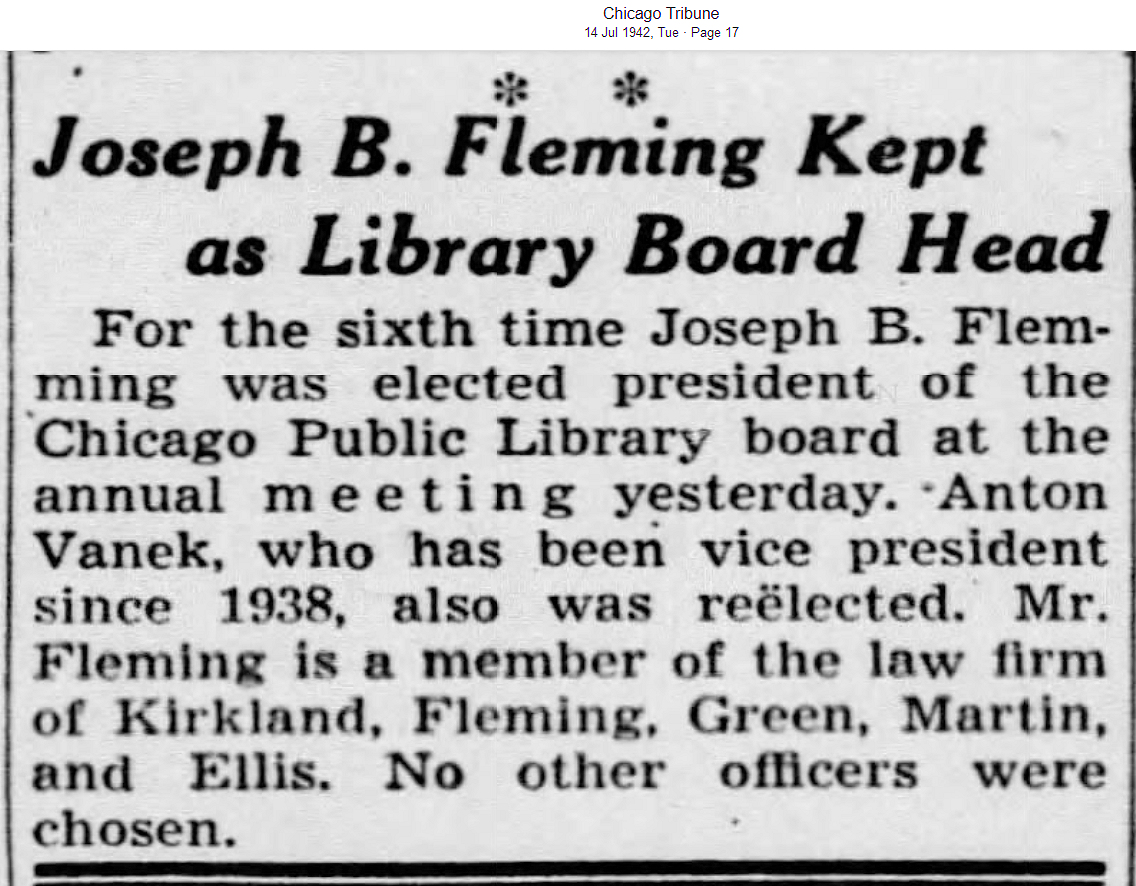
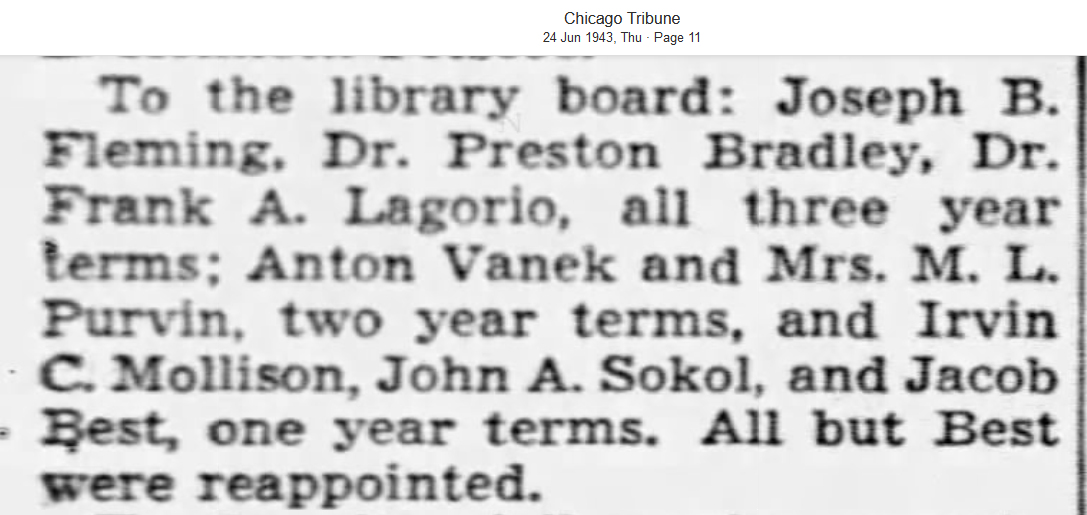
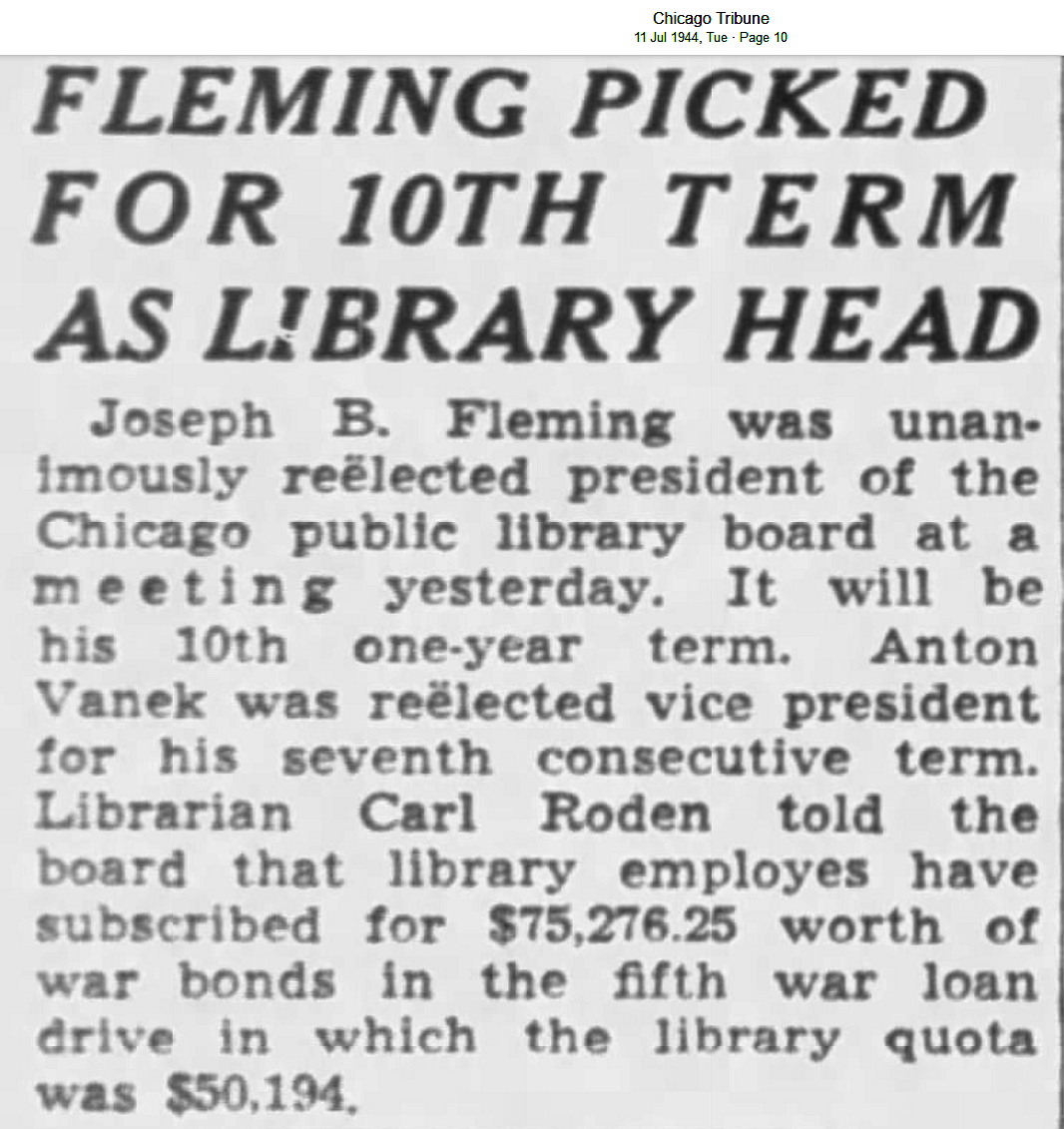
Anton Vanek - Involvement in Bohemian Singing Societies
From the many organizations he formed or belonged to, from the many events he planned, conducted or attended, and from the numerous newspaper articles, one could readily say that anything related to Czechs and singing was the true passion of Anton Vanek.
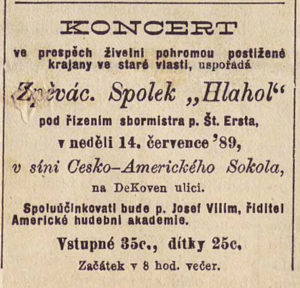 Newspapers.com and the Foreign Language Press Survey (which provide much information on Vanek) only begin to make mention of Vanek and his involvement in Czech singing societies in 1911 and 1912. His biography in the 1926 publication, Zlata Kniha, mentions he founded the Hlahol singing society at about age sixteen. Components of Hlahol would eventually be merged with other Czech singing societies. An advertisement for a concert including Hlahol appeared as early as 1889. (10) An article in the Czech language newspaper Svornost describes that Hlahol was one of the singing groups performing at the grand opening of Czech Hall in 1892. (11)
Newspapers.com and the Foreign Language Press Survey (which provide much information on Vanek) only begin to make mention of Vanek and his involvement in Czech singing societies in 1911 and 1912. His biography in the 1926 publication, Zlata Kniha, mentions he founded the Hlahol singing society at about age sixteen. Components of Hlahol would eventually be merged with other Czech singing societies. An advertisement for a concert including Hlahol appeared as early as 1889. (10) An article in the Czech language newspaper Svornost describes that Hlahol was one of the singing groups performing at the grand opening of Czech Hall in 1892. (11)
In 1890, the "Cesky Delnicky Pevecky Sbor" (Bohemian Workingmen's Singing Society) was formed. In 1905 a portion of Hlahol was merged into this new singing society. (12) 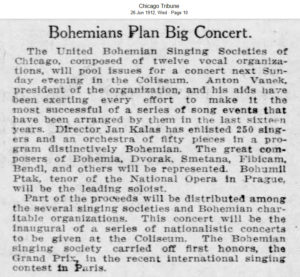
Individual Czech singing groups joined together in larger umbrella Czech singing societies.
Bohemian Night at the Coliseum - Denní Hlasatel, July 1, 1912 The Česká Ústřední Pĕvecká Jednota (Federation of Bohemian Singing Societies) took charge of the arrangements for the evening. Credit for the success of of the concert goes to Mr. Anton Vanek, president of the Česká Ústřední Pĕvecká Jednota and to Mr. J. Kalaš, their leader. (13)
Ceska Ustredni Pevecka Jednota (Federation of Bohemian Singing Societies), a combination of eight Czech singing societies held their convention in Chicago. Anton Vanek was the convention chairperson. (14) Ustredni Pevecka Jednota (United Singing Societies), was another, and in 1917 Anton Vanek was its treasurer. (15)
In 1943, a year after the destruction of Lidice by the Nazis, the Lyra Chorus was honoring Lidice in song. The Chicago Tribune would post in October the images of the Lyra, with Anton Vanek as director, singing during a rehersal. Many familiar prominent Czechs are in those images. Click on this to see those images. A Chicago radio station also honored Lidice in a musical broadcast.
For more than thirty years newspapers would continue to announce concerts, singing societies and the events they participated in. There are three events which gathered the most newspaper coverage.
1928 - Anton Vanek Leads Czech Singers and others to Czechoslovakia for 20 concerts there.
The Bohemian Working Men's Choir Lyra Wins At The 1933 Men's Choir Festival. Anton is Choir President. (16)
The Bohemian Working Men's Choir Lyra Leaves For Europe in 1932. Anton Vanek is Choir President (17)
Vanek Memorials
Father Tomas Vanek died in 1918 - Find A Grave #218732507 Bohemian National Cemetery - Lot 2 Block 6 Section K
Mother Alzberta died in 1929 - Find A Grave #260205960 - Bohemian National Cemetery - Lot 2 Block 6 Section K
Anton's first wife, Clara, died in 1917 - Find A Grave #218791723 - Bohemian National Cemetery - Lot 2 Block 6 Section K
Anton Vanek died September 19, 1945. - Find A Grave #260206090 - Lot 2 Block 6 Section K - Bohemian National Cemetery
Newspapers carried several obituaries:
Anton Vanek, 2337 S. Central Park Avenue, beloved husband of Antoinette C. Vanek, fond father of Robert I., Victor H., Arthur W., Charles R., Anton T. Jr., Lillian C. Jicha and Clara H. Curda, brother of Anna Dite, Elizabeth Adamira, and Marie Mudra, father-in-law of Mae, Margaret, Camile M., Marie, and Katherine Vanek, Frank J. Jicha and James W. Curda, grandfather of eight grandchildren. Services Saturday, Sept. 22, at 2 p.m., at chapel, 6301 W. Cermak road, Berwyn. Cremation at Bohemian National cemetery.
Anton T. Vanek, 73, of 2337 S. Central Park av., head of the real estate firm of Anton T. Vanek & Sons, 3707 W. 26th St., died last night in his home. For 12 years he was vice president and member of the board of trustees of the Chicago public library. He was a past president of the Lyra society, a Czechoslovakian singing group which he accompanied on two European tours.
Anton's Second Wife, Antoinette, died in 1972 - Find A Grave #260508450 - Queen of Heaven Catholic Cemetery, Hillside, Illinois.
References:
1. Chicago Directory of 1895 - www.chicagoancestors.org
2. Chicago Census of 1900 - Anestry.com
3. Chicago Census of 1910 - Ancestry.com
4. Advertisement - Anton Vanek Real Estate Chicago Eagle 1-27-1912, Page5.
5. Advertisement and Translation (Search Anton Vanek) - Foreign Language Press Survey - ftps.newberry.org
6. League of Building and Loan Assocations - Denni Hlasatel - 10-16-1920, by Joseph Voborsky and the Annual convention of the League of Building and Loan Associations - Denni Hlasatel - 10-28-1913, Both are translated articles in the files (Search Anton Vanek) of the Foreign Language Press Survey, ftps.newberry.org
7. Advertisement "Anton Vanek and Son", Amerikan Kalendar, August Geringer Publisher, Chicago, Illinois, Volume 1941, Page 253.
8. "Anton Vanek For Alderman" - Chicago Eagle, Chicago, Illinois, March 23, 1912, page 4.
9. "Libraries and the Reading Public in Twentieth Century America", Edited by Christine Pawley and Louise S. Robbins, The University of Wisconsin Press, Madision, 2023, Pages 120 - 123.
10. Koncert Advertisment - Hlahol - Duch Casu, Chicago Foreign Language Newspaper, Frank Zdrubek Editor, August Geringer Publisher, July 1, 1889, Page 9.
11. Grand Opening of "Cechie Hall."Svornost, October 10, 1892 (Search Hlahol) Foreign Language Press Survey - ftps.newberry.org
12. "The Bohemian Workingmen's Singing Society Moves into Own Quarters and Inducts the Hlahol Singing Society into its Membership" Denní Hlasatel, January 16, 1905 (Search Hlahol) Foreign Language Press Survey - ftps.newberry.org
13. "Bohemian Night at the Coliseum" - Denní Hlasatel, July 1, 1912 - (Search Anton Vanek) - Foreign Language Press Survey - ftps.newberry.org
14. "A Convention of the Ceska Ustredni Pevecka Jednota" - Denní Hlasatel, Nov. 1, 1915 (Search Anton Vanek) - Foreign Language Press Survey - ftps.newberry.org
15. "Singers Hold Meeting" - Denní Hlasatel, Dec. 3, 1917 (Search Anton Vanek) - Foreign Language Press Survey - ftps.newberry.org
16. "Bohemian Working Mens Choir Wins Festival" - Chicago Tribune, August 15, 1933, Page 9.
17. "Bohemian Workingmens Singing Society Lyra Before Europe Trip" Chicago Tribune, May 11, 1932, Page 62.
